Jordan Improving Ties With Syria Eyeing Iran's Influence On Its Borders
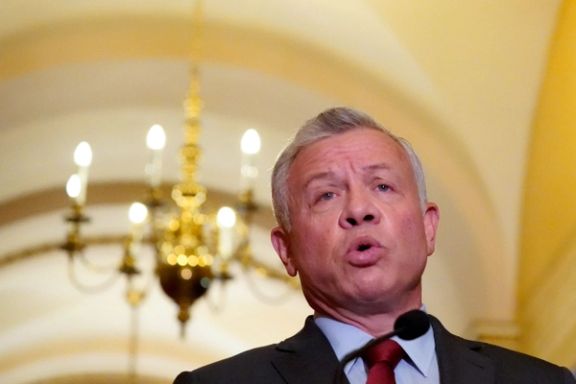
In a major move to reduce the isolation of his regime, Syria’s Bashar al-Assad called Jordan’s King Abdullah on Sunday, for the first time in a decade.

In a major move to reduce the isolation of his regime, Syria’s Bashar al-Assad called Jordan’s King Abdullah on Sunday, for the first time in a decade.
Jordan’s king has been advocating normalization of relations with Assad, calculating that the Syrian leader was there to stay. Jordan opposed Assad as a bloody civil war began in Syria a decade ago and even called for him to resign.
Abdullah affirmed his country’s support for “efforts to preserve Syria’s sovereignty, stability, territorial integrity and people.”
Reuters reports that Abdullah has been pressing Washington for months to engage Syria and back Russia's intervention in the war-torn country, saying this is needed to wean the country away from Iran's growing foothold, officials say.
The US State Department said on Wednesday that Washington has no plans to "normalize or upgrade" diplomatic relations with Assad's government and also does not encourage others to do so.
Amman has sought Russia's support to rein in the growing foothold of pro-Iranian militias who hold sway in southern Syria along the Syrian border with Jordan which has also alarmed Israel and Washington, officials add.
With reporting by Reuters and AP
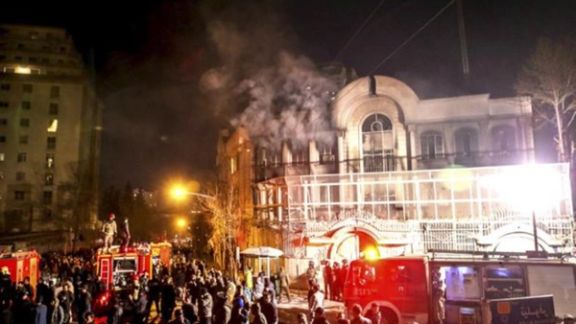
Saudi Arabia confirmed on Sunday it had held its first round of direct talks with Iran's new government last month to reduce tension between the rival powers.
The longtime foes who severed ties in 2016 began talks in April, at a time when Washington and Tehran were discussing reviving a nuclear pact that Riyadh and its allies had opposed.
Three rounds of Saudi-Iranian talks were held in Iraq in the months before Iran's new hardline president, Ebrahim Raisi, took office in August.
Foreign Minister Prince Faisal bin Farhan al-Saud said the latest round had taken place on Sept. 21. He did not give the location of the meeting. The date coincides with a speech by Raisi at the UN General Assembly in New York.
"These discussions are still in the exploratory phase. We hope they will provide a basis to address unresolved issues between the two sides and we will strive and work to realize that," he told a joint news conference.
Saudi Arabia and Iran have backed opposing sides in regional conflicts and political disputes in Syria, Lebanon and Iraq for years, and Saudi Arabia has led an Arab coalition waging war against the Iran-aligned Houthi movement in Yemen since 2015.
Riyadh and Tehran have both said they hope the talks can ease tensions, while playing down expectations of a major diplomatic breakthrough. Iran did not immediately comment on the Sept. 21 round of talks. Riyadh has said it would judge the government of Raisi by the reality on the ground.
Prince Faisal was speaking during a visit to Riyadh by EU foreign policy chief Josep Borrell, who said he had briefed his partners on the prospects for restarting the nuclear talks.
Report by Reuters
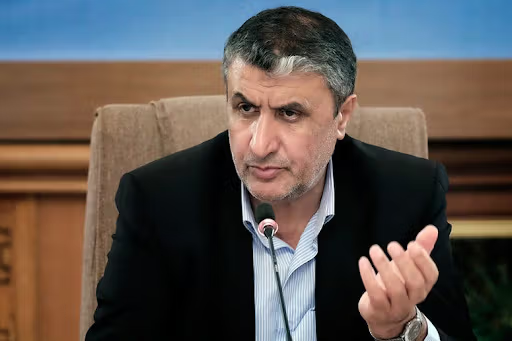
Mohammad Eslami, the head of Iran's nuclear organization has told reporters that Israel was responsible for an attack on one of its nuclear facilities in June.
Earlier on Sunday he told the Russian Sputnik news agency it was regrettable that neither the UN nuclear watchdog, IAEA nor "the countries that have made monitoring claims against" Iran have condemned the "terrorist act" that severely damaged a centrifuge component manufacturing workshop in Karaj, near Tehran, in June.
"Not condemning a terrorist act at an official site under IAEA supervision is tantamount to supporting terrorists," Eslami said in an exclusive interview with Russia's Sputnik news agency Sunday. Iran so far had not officially named Israel or any group as responsible for the attack on the Karaj facility but has accused Israel for the April attack on the Natanz enrichment facility.
Iran and the IAEA have been in a standoff in recent weeks over Tehran's denial of access to IAEA inspectors to service the equipment at the at the TESA Karaj Complex, in north-central Alborz province. Since February Tehran has limited IAEA inspections. The IAEA says the limitations have seriously affected its monitoring activities. The European Union-brokered nuclear talks aimed at restoring the JCPOA that began in Vienna in April were also suspended in June after six rounds of talks and Iran is not showing an active interest in resuming them.
Denial of access to IAEA inspectors can be interpreted as a toughening of Iran’s position in its dealings with the international community over its nuclear program.
Many believe that Tehran is stalling the resumption of talks over reviving the Joint Comprehensive Plan of Action (JCPOA), to add to its highly enriched uranium stockpile to strengthen its position in any future talks with more bargaining chips. Western powers are concerned that the delay in resumption of Vienna talks, and Iran's further violations of its commitments under the deal including higher enrichment levels and stockpiling of highly enriched uranium, may destroy any chances of restoring the deal.
Although the JCPOA only allows Iran to enrich uranium to the level of 3.67%, Tehran has continuously increased its enrichment level since the US withdrawal from the deal in 2018. Tehran has increased its stockpile of 60% enriched uranium from 2.4kg in May to 10kg in August according to IAEA estimates. The amount of 20% enriched uranium has also gone up from 62.8 to 84.3kg.
Meanwhile, it appears that Tehran is seeking concessions from the US to return to the talks. Foreign Minister Hossein Amir-Abdollahian in an interview with the state-run television (IRIB) said while in New York recently, he demanded the release of $10 billion of Iran's frozen funds by the US as a good will gesture to encourage Iran to resume the talks.
Eslami who had earlier on September 30, called the recent report of the International Atomic Energy Agency (IAEA) on access to monitoring cameras at the Karaj facility "unconstructive" and the IAEA director general's statements about man-made uranium particles at three Iranian sites "false", charged in the interview with Sputnik that the issue of man-made uranium particles was "false news" which a "terrorist group -- presumably the Mujahedin-e-Khalq organization – is actively promoting. "The IAEA, as an international body, should not fall for these tricks and become a puppet in the hands of this terrorist group," he declared.
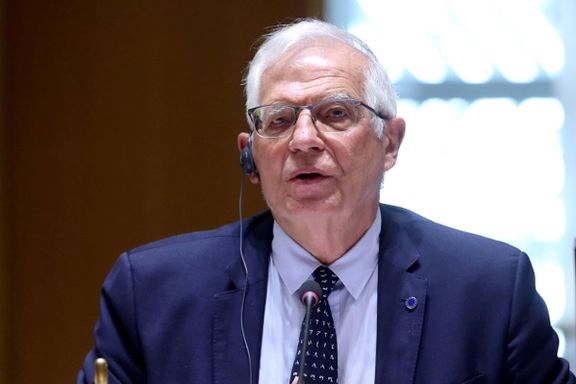
The EU foreign policy chief Josep Borrell, speaking at a joint news conference with his Saudi Arabian counterpart, said he hoped nuclear talks between global powers and Iran would restart in Vienna "soon".
The EU diplomat, who is in Riyadh following visits to Qatar and the United Arab Emirates, said he briefed his partners on the prospects for restarting nuclear talks and exchanged views with Saudi officials on Yemen and Afghanistan.
Turning to the region, he said the EU was ready to pursue trade deals with Gulf countries, saying the bloc supported Saudi Arabia's modernization drive.
Brussels was also engaging on human rights and voiced hope the dialogue would produce "real results", he added.
Saudi Arabia's social and economic reform drive has been accompanied by a crackdown on dissent, which drew intense international scrutiny following the 2018 murder of Saudi journalist Jamal Khashoggi at the kingdom's Istanbul consulate.
Riyadh has also faced criticism over Yemen, where it leads a military coalition that has been battling the Iran-aligned Houthi movement for over six years.
Describing Yemen as a "terrible tragedy", Borrell voiced support for a peaceful settlement of the conflict, largely seen in the region as a proxy war between Saudi Arabia and Iran.
Saudi Foreign Minister Prince Faisal bin Farhan al-Saud said Riyadh has a "very robust" dialogue with the United States to end the war.
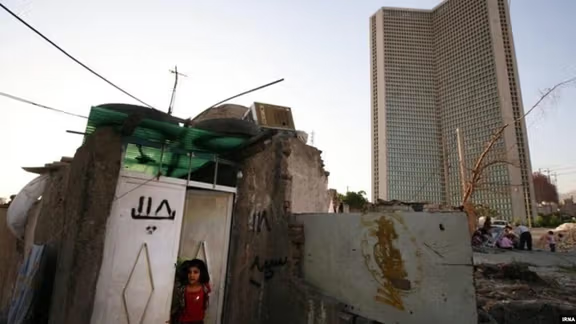
Expanding shantytowns and slums around Iran's large cities have become a serious security problem for the Islamic Republic as unrest has grown in recent years.
According to experts, living in shantytowns has now become a normal part of life for a growing number of Iranians.
Mohammad Reza Mahboobfar, a member of the Iranian Land Management Association, stated on May 28, 2020, that more than 38 million people now live in shantytowns across Iran and 7.6 million people live in the vicinity of cemeteries.
By definition, a shantytown or slum refers to a poor neighborhood formed around a large city with residents who cannot afford to live in the city proper because of poverty.
Currently, there are almost no major Iranian cities without a significant portion of the population living on the outskirts in very poor and deplorable conditions. There are two main reasons for this phenomenon, which became accentuated after the establishment of the Islamic Republic in 1979.
First, migration of villagers who leave their villages due to poor living conditions and move to cities in hope of a better life. But because they cannot afford the high cost of living in cities, they end up living in sheds around cities.
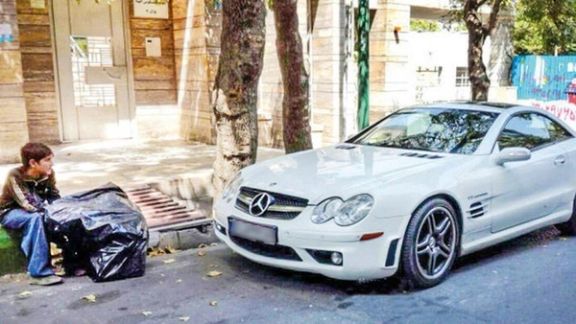
Second, the catastrophic economic situation in Iran, with inflation above 50% has caused prices to skyrocket. Given that wages and salaries have not increased in line with the inflation rate, it has forced some in the lower middle-class, which is a large portion of urban residents, to leave their houses and apartments in the cities and move to much cheaper housing in what are considered shantytowns.
This quick expansion has been at such an extent that some regime officials refer to it as a security problem for the regime.
Some have said that as much as 80% of Iran's population currently lives below the poverty line, and one-third of Iran's labor force is unemployed. Many factories and manufacturing plants have either been forced to shut down or operate at less than half capacity.
Many youths, despite having university degrees, are working as laborers, or as cab drivers. All these factors have caused a significant portion of these people to no longer be able to afford the high cost of living in the cities, and as a result, they have moved to the outskirts of cities, where the cost of living is lower.
Although there are no accurate and up to date statistics of the actual number of these slum dwellers, according to figures from two years ago, more than 2.5 million people live on the outskirts of Tehran, 1.3 million people around the city of Mashhad, more than 800,000 people on the outskirts of Tabriz, about half million people live around Esfahan, 400,000 people around the city of Ahvaz, 300,000 people around the city of Kermanshah, and this goes on for all the major cities. This situation is getting worse by the day as poverty increases.
The scale of this problem has reached a point where it has become one of the most serious issues for the Iranian regime.
Living on the outskirts of cities is tough for the residents. They have little access to sanitation such as clean running water, sewage system, electricity. They have no cultural and educational facilities such as standard schools, park, sport fields, proper hospitals, and most importantly security.
Most of the people living in these areas are either unemployed or have unstable daily jobs. For this reason, they are forced to resort to illegal activities such as drug trafficking, theft, prostitution, and other crimes for their survival, and many of them are drug addicts.
According to Tehran Prosecutor Al-Ghassi Mehr, 90% of those who are sent to prison for drugs or robbery are unemployed. These people, most of whom are young not only have no hope for a better future but also have nothing to lose. These days, it has become common to see scenes of armed robberies or theft of cars captured on CCTV cameras.
But petty crime does not worry the regime. What worries Supreme Leader Ali Khamenei and regime officials is the possibility of another uprising like the one in November 2019 when thousands of people in various locations suddenly came out into the streets to protest a hike in fuel prices. Youth from slums took control of many neighborhoods.
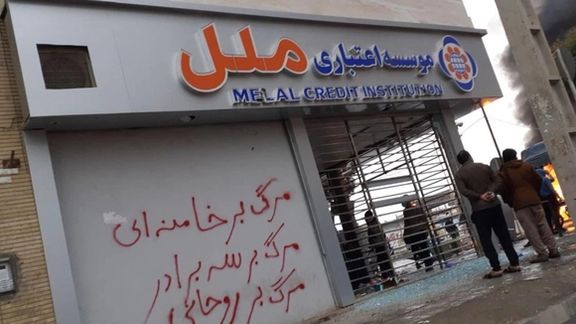
In more than 100 cities some of them set fire and destroyed government symbols, such as 900 bank branches, 3,000 bank ATMs, 80 department stores owned by Iran’s Revolutionary Guards Corps (IRGC), and many police vehicles, police stations, militia (Basij) centers, seminaries, and statues and posters of Khamenei and Khomeini. But remarkably in this uprising, no shops, and property belonging to ordinary people were looted or damaged.
According to officials, Khamenei, seeing that the uprising was about to lead to the overthrow of his regime, ordered his forces to open direct fire on the people. Khamenei by deploying IRGC, armored vehicles, and even attack helicopters, killed more than 1,500 people in the streets within 2-4 days and imprisoned 12,000 people suppressing the uprising.
Of course, Iran had witnessed another major uprising in 2009, which took place after the controversial reelection of populist president Mahmoud Ahmadinejad. But there was a major difference between that uprising and that of 2019 nationwide protests. In 2009, most of those who took to the streets were the middle-class city residents, but in 2019 almost all those who took part in the uprising were from lower strata of society, especially the residents of slums,who used to support the regime. This time, they were demanding basic living standards. Through decades of suffering and hardship, the protestors had come to the unshuttering conclusion that the top leadership of the Islamic Republic was mired in corruption and would do nothing to improve their welfare and living conditions.
Opposition to the government among the lower classes, who now make up most of the society, has become a major threat to Khamenei and his president, Ebrahim Raisi. They are very much aware that another widespread uprising, like November 2019, could not easily be controlled. Fear of such a danger led Raisi to promise in his election campaign to build one million housing units a year for low-income groups.
The Raisi government is nursing a 50 percent budget deficit, or 22 billion dollars in free market exchange rate, and is incapable of budgeting for even 10,000 housing units a year.
Some in the Iranian regime's media say that shantytowns in Iran are like a barrel of gunpowder that is about to explode.
Mohammad Reza Mortazavi, Secretary-General of the House of Industry and Mines, said in an interview with Etemad online on May 25, 2020: "It is very clear to me that one day people will pour into the streets and take over the Bastille Hills ... Poverty is the result of an unjust distribution of wealth.”
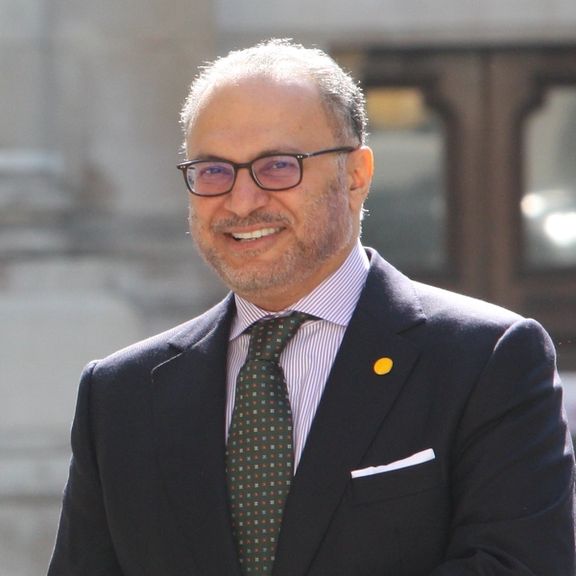
The United Arab Emirates is trying to manage long-running rivalries with Iran and Turkey through dialogue to avoid new confrontations, a senior official said.
Anwar Gargash, diplomatic adviser to the UAE president, told a conference on Saturday there was uncertainty about the United States commitment to the region and concern about a "looming cold war" between Washington and Beijing.
Gulf states, which have strong economic ties with China, are also heavily reliant on the U.S. military umbrella and are closely watching talks between global powers and Iran to revive a 2015 nuclear pact as well as the Taliban's return to power in Afghanistan after the U.S. withdrawal.
"We will see in the coming period really what is going on with regards to America's footprint in the region. I don't think we know yet, but Afghanistan is definitely a test and to be honest it is a very worrying test," Gargash said.
"Part of what we need to do is manage our region better. There is a vacuum and whenever there is a vacuum there is trouble," he told the World Policy Conference.
The UAE has moved to de-escalate tensions by engaging with non-Arab Iran and Turkey, whose influence it had moved to counter in conflicts in Yemen, Libya and elsewhere in the region.
The UAE and Saudi Arabia believe the 2015 nuclear pact was flawed for not addressing Iran's missiles programme and network of regional proxies. The UAE has also moved to combat Islamist groups such as the Muslim Brotherhood which Gulf states see as a threat to their dynastic system of rule.
"Turkey's recent re-examination of its policies towards Egypt, the Brotherhood and towards Saudi Arabia and others is very welcome. And I think for us to come mid-way and reach out is very important," Gargash said.
"The Turks have been very positive about what we are saying to them," he said. "Am I very positive about the reach out to Iran? Yes I am. Am I very positive that Iran will change its regional course? I have to say I am more realistic here, but I am betting Iran is also concerned about vacuum and escalation."
Gargash said the pandemic placed non-political priorities at the forefront and that a main concern now was being caught in between the United States and China.
"We are all worried very much by a looming cold war. That is bad news for all of us, because the idea of choosing is problematic in the international system, and I think this is not going to be an easy ride," he said.
Report by Reuters